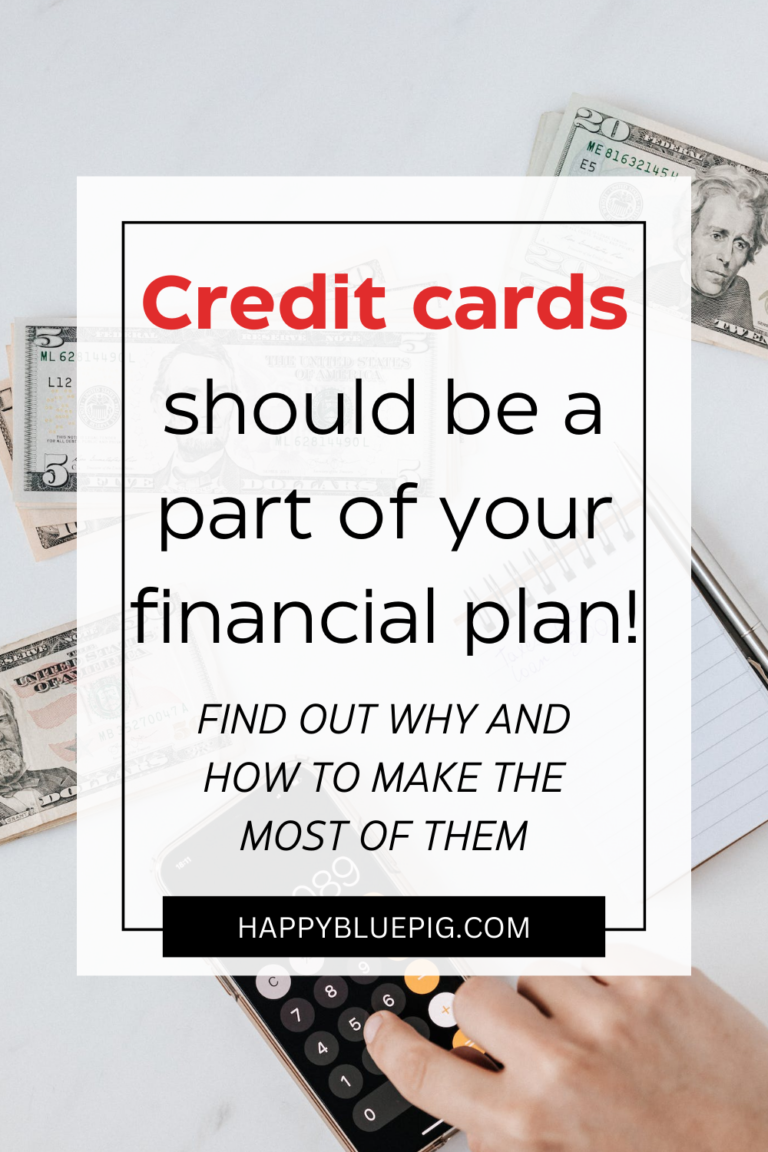I can practically guarantee that you have heard the advice “never use a credit card”. Even some famous financial professionals draw a hard line about credit card usage. I say, credit cards aren’t bad. A credit card is a tool. Credit cards can be dangerous, if you don’t have a financial plan. But when you understand and control your finances, the credit card can give you a boost! Let’s explore how to use a credit card to help your wallet, and protect yourself from the threat of debt.
This post may contain affiliate links, which means I’ll receive a commission if you purchase through my links, at no extra cost to you. Please read full disclosure for more information.
Benefits of Credit Card Use
Rewards points
Rewards points are basically free money. And when you have a tight budget, it can help you pay for extra necessities or small luxuries. For us, reward points help us eat out or get ice cream when we wouldn’t normally have enough in our budget. They can help buy a pair of work boots needed for a job when the clothing budget is all gone. You have to pay the bills anyway, why not get a bit of money back?
Not all credit cards are created equal. I have 4 credit cards, and I chose them each for a particular reason at a particular time. The credit card I use for each purchase is strategically planned out to maximize rewards. One card has a consistently decent rate on all purchases, another has a low overall rate but gives better reward points on 3 types of purchases I make frequently. The final card has the highest rewards rates on rotating categories. No purchase is mindless; if I’m buying fuel, I’m going to make sure I’m using the card that has the best rewards on fuel that month.

Ease
With a credit card, you don’t need to carry a lot of cash for larger purchases. And with direct deposit, we don’t all regularly visit the bank to deposit or withdraw funds. A credit card saves you from stopping at the bank frequently for withdrawals.
It is quick and easy to use a credit card these days. In particular, paying at the pump with a card is much more convenient. As a parent, I’m so glad that I don’t have to get my son out of the car seat to go in and pay every time I fill up. You could use a debit card for convenient purchasing, but I feel more confident with a credit card if a security breach were to happen.
Boosts credit scores
When used properly, credit card use can improve your credit score. A credit card is often the first credit account that people open, so it contributes to the length of credit history. If you keep your spending low and pay in full every month, your score will improve. Having a good mix of types of credit accounts is also beneficial to your credit score, so having a credit card in addition to a mortgage will give you a better mix. To learn more about credit scores, check out my article here.
Your money is safe from your dog
You may laugh, but I just read a news article last night about a family whose dog chewed up an envelope containing $4000. If you can use a credit card for larger purchases, you don’t risk your cash being lost or destroyed in some way. If the credit card is chewed up, you can request a replacement. Should you misplace your credit card, you can freeze it or cancel it quickly.

Fraud protection
You may have heard of credit cards as a buffer. Credit cards as a buffer simply means that the money doesn’t come directly from your bank account. This provides an extra measure of security. Debit cards have more protections against fraud than ever, but a breach might mean my accounts and funds are temporarily inaccessible. I may also end up responsible for a small amount of the cost of the fraud, depending on the account. When there was fraud on my credit card, I paid nothing. The credit card company caught the fraud very quickly. The card was cancelled and I did have to wait for a new one, but I could still pay for what I needed using other credit cards or my bank accounts.
A Credit Card Myth: Credit cards are beneficial because they provide a buffer for paying for purchases
Let me be clear, it is risky business to use credit cards as a buffer for when you’re short on money. I’ve heard some financial advice suggesting that credit cards are helpful because you have some extra time to pay for your purchase. They say that you have an extra month to adjust your spending and cash flow if needed. Now that’s fine if you have the money in your savings and you need to transfer it to your checking account. But it’s not fine to spend money you don’t have, counting on future income. What if you have to take an unexpected leave of absence from work due to health or family emergency? The paycheck you were expecting never comes in, and you can’t pay the credit card bill. We can’t always control our cash flow the way we may want, so you need to be proactive, not reactive, with your finances.

Risks of Credit Card Use
Easy to buy without thinking
Studies have shown that we are all likely to spend more when we use a credit card. Now, many of those studies do have limitations. For example, multiple often-quoted studies from a bank and from a business state that the average credit card purchase is higher than the average cash purchase. In my finances, I purposely use credit cards for bigger purchases. It means more rewards, and less cash to carry around in my wallet. I do use cash, but primarily only for purchases less than $25 or at the farmers market.
This study from 2021 and this study from 2008 look at how our brain processes purchases made with a credit card vs with cash. The first article discusses how the reward center of our brains may be activated by credit cards. The other hypothesizes that since the money doesn’t actually leave your bank account when using a credit card, our brains process the pleasure of the purchase but not the financial pain. The good news is that the second study did find that those who anticipate the pain of paying the bill in the future do tend to spend less on credit card purchases.
It is so easy to pay with your credit card these days. Online, with saved credit card information, you can make a purchase instantly. I’m not saying you should never save your credit card information. It is way better than running out to the car in pouring rain to get your purse because you forgot it and have to pay the bill that night. It is just something important for us to be aware of when making a purchase. And maybe take a moment to imagine paying that bill before you swipe your credit card or hit submit on that online purchase.
Sometimes there is a fee
Many places don’t charge a fee for using a credit card, but there are some businesses that do. Usually, the fee is relatively small, but it’s still extra money lost. We don’t need to pad the wallets of the credit card companies. If the fee is 1% and your reward is 2% or more, it might still be worth it to use your card anyway.
Credit card debt and fees
Credit card debt is high interest. They can make a lot of money off of us, the consumers, if we don’t pay our whole balance. Once you’ve accumulated the debt, it’s much harder to pay off with those high interest rates. With a credit card, you will also incur fees if you forget and miss a payment. You won’t have these problems with cash or a debit card.
Accumulate debt you can’t pay
Buy now, pay later. If you have the money waiting in an account, that’s not a problem. But what if something unexpected comes along and suddenly the money isn’t there at the end of the month. Losing a job, car breakdown, water heater breaks. If you don’t have an emergency fund, now you have credit card debt. And as we just discussed, that high interest makes it harder to pay off. If you don’t already have an emergency fund, check out my article here to learn how to start one.
How to use your credit card well
Pay balance in full each month
This is the most important thing you can do. If you remember nothing else, make a budget and stick to it and always pay your credit card bills in full! If you already have debt, make a plan to start paying it off.

Do not use your credit card for discretionary purchases if you have trouble controlling your spending
If you have trouble controlling your shopping or staying within your budget, don’t take the credit card out for those kinds of purchases. Try using your credit card for an automatic, fixed payment for something in your budget. An example of this would be your phone bill, cable/streaming bill, utility bills, or even your mortgage. You will get the benefit of building a good credit score with on time payments, made in full. After all, it’s not very tempting to overspend on your mortgage.
Remove your saved credit information from every site and don’t enter it until you are sure you’re in control of your spending. Definitely don’t enable one click ordering. Take that extra time to consider your purchase. Practice what we learned from that research article. Take some time to imagine paying the bill and the financial pain of losing that money in your account.
Only make a purchase if it is in your budget!
The problem with credit card debt and overspending is virtually eliminated if you only purchase budgeted items. If your budget is balanced, and you remember to pay your bill on time, you’re safe. If you don’t have a budget, start here. I’ll walk you through how to make one. My budget spreadsheet is a quick, easy way to get started.
Try to keep spending 30% or less of credit limit
If you keep your spending to 30% or less of your available credit, it boosts your credit score. It’s important to remember, a credit score is only important when you are seeking credit (or maybe a rental). So you can absolutely spend more than 30% of your available credit at times as long as it’s for budgeted expenses. Just try, overall, to keep spending lower for your best credit score.
Never buy more just to get rewards
Rewards are nice, but they are not worth the extra spending. Don’t buy extra or buy things you wouldn’t normally buy just to get more airline miles or another gift card.
Any unanswered credit card questions? Do you have any tips or strategies for using credit cards wisely? Comment below or email me at [email protected]. I would love to hear from you!


